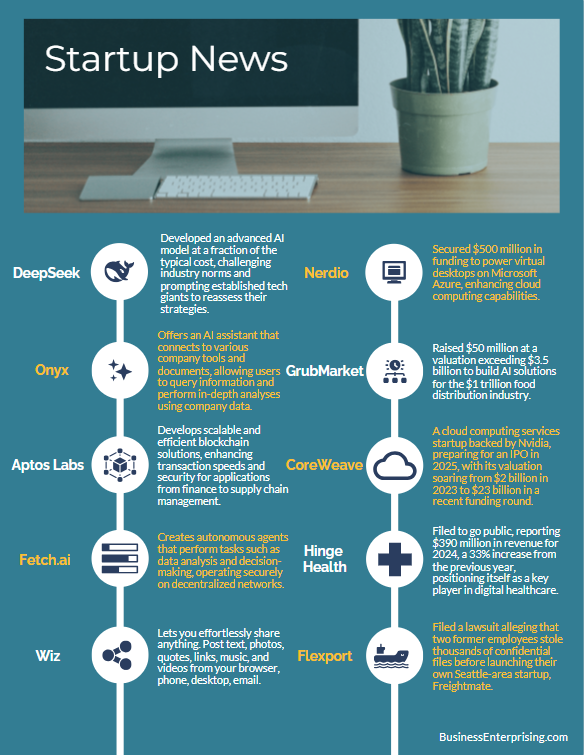
However, breaking into competitive markets is not easy. Many startups face regulatory challenges, leadership shifts, and economic uncertainty. While some secure massive funding, others struggle to scale their operations. Understanding these obstacles can help you assess which companies are positioned for long-term success.
Additionally, acquisitions and IPOs continue to shape the startup ecosystem. Large corporations acquire smaller companies to strengthen their market position, while startups with strong growth potential go public. These moves signal broader industry trends and can impact how businesses evolve.
Keeping up with startup developments can give you insight into the future of business and technology. Whether you are an entrepreneur, investor, or industry observer, staying informed helps you anticipate shifts before they happen.
Disruptive Startups Reshaping Industries
In recent years, several startups have emerged that are challenging traditional industries with innovative solutions. These startups making headlines are not only introducing new technologies but also redefining how businesses operate.
One notable example is Neuralink, which is developing implantable brain-computer interfaces. Their technology aims to enable direct communication between the human brain and computers, potentially revolutionizing healthcare by offering new treatments for neurological conditions. This advancement could lead to significant improvements in patient care and open new avenues for medical research.
Another startup, Anthropic, is making strides in artificial general intelligence (AGI). By focusing on creating AI systems with human-like reasoning abilities, Anthropic aims to develop AI that can adapt to various tasks across different industries. This approach could lead to more versatile and efficient AI applications, impacting sectors such as finance, healthcare, and customer service.
In the field of sustainable materials, companies like TômTex are developing alternatives to traditional textiles. By creating materials from renewable resources, they offer eco-friendly options for industries like fashion and automotive. This innovation addresses environmental concerns and provides sustainable choices for consumers and manufacturers.
The financial technology sector is also experiencing disruption from startups like Figure. By leveraging blockchain technology, Figure streamlines processes such as loan origination and asset management. This innovation reduces costs and increases transparency, challenging traditional financial institutions to adapt.
In the realm of artificial intelligence, companies like DeepSeek have developed advanced AI models at a fraction of the typical cost. By optimizing resources and leveraging existing technologies, DeepSeek has made AI more accessible, potentially democratizing innovation across various sectors.
These startups exemplify how innovative approaches can disrupt established industries. By introducing new technologies and business models, they challenge the status quo and pave the way for future advancements.
Record-Breaking Funding Rounds
Recent record-breaking funding rounds highlight a robust investment climate, signaling strong confidence in innovative startups. Notably, AI-focused companies have attracted substantial capital, reflecting the sector’s rapid growth.
In December 2024, Databricks secured a $10 billion investment, elevating its valuation to $62 billion. This funding aims to support global expansion and technological advancements, underscoring investors’ belief in Databricks’ data analytics capabilities.
Similarly, OpenAI raised $6.6 billion in October 2024, achieving a valuation of $157 billion. This investment is intended to enhance AI research and product development, indicating a strong market demand for advanced AI solutions.
Elon Musk’s xAI also made headlines by securing $6 billion in May 2024, valuing the company at $24 billion. This substantial funding reflects investor enthusiasm for AI-driven innovation and its potential applications across various industries.
These startups making headlines with massive investments suggest a market shift towards AI and data analytics. Investors are increasingly focusing on technologies that promise scalability and significant returns. Consequently, this trend may encourage more entrepreneurs to explore opportunities within these burgeoning sectors.
However, while these funding milestones indicate optimism, they also raise questions about market saturation and valuation sustainability. As more capital flows into AI and related fields, the competitive landscape intensifies, challenging startups to differentiate themselves and deliver on high expectations. The recent influx of capital into startups, particularly in AI, signifies robust investor confidence. Yet, it also calls for strategic planning and execution to ensure these investments translate into long-term success.
Tech-Driven Startups Leading the Way
Emerging technologies like artificial intelligence (AI) and blockchain are rapidly propelling startups into the spotlight, fostering innovation across industries. As a result, these startups making headlines are not only introducing groundbreaking solutions but also reshaping traditional business models in significant ways. Their impact extends across multiple sectors, influencing how companies operate and compete.
In the AI domain, companies like DeepSeek are actively disrupting the tech landscape. Notably, DeepSeek developed an advanced AI model at a fraction of the typical cost, challenging industry norms and prompting established tech giants to reassess their strategies. Consequently, this development underscores a shift toward more cost-effective and efficient AI solutions, ultimately democratizing access to advanced technologies.
Similarly, startups like Onyx are integrating AI to enhance workplace efficiency. By offering an AI assistant that connects to various company tools and documents, Onyx allows users to query information and perform in-depth analyses using company data. As a result, this innovation streamlines operations and reduces the time spent on data retrieval, further showcasing AI’s potential to transform business processes.
At the same time, blockchain technology is also at the forefront of startup innovation. Companies like Aptos Labs are developing scalable and efficient blockchain solutions, specifically addressing limitations in existing platforms. As a result, their work enhances transaction speeds and security, making blockchain more accessible for various applications, ranging from finance to supply chain management.
Moreover, the convergence of AI and blockchain is giving rise to novel applications. For instance, Fetch.ai is creating autonomous agents that perform tasks such as data analysis and decision-making while operating securely on decentralized networks. Consequently, this synergy enhances efficiency and opens new avenues for automation in sectors like logistics and healthcare.
Sustainability and Social Impact Ventures
In recent years, startups making headlines have embraced eco-friendly and socially responsible business models, driving positive change. These ventures not only address environmental concerns but also promote social well-being.
One notable example is Repurpose, an eco-friendly brand offering compostable household items. By integrating AI to scale operations, Repurpose maintains competitiveness while adhering to sustainability goals. Their approach demonstrates how technology can enhance efficiency without compromising environmental values.
Another impactful venture is RecycleSmart, often likened to “Uber Eats for recycling.” This Australian startup collects household and commercial waste, sorts it, and sells recyclable materials. By partnering with local councils, they provide convenient recycling solutions, encouraging community participation in waste reduction efforts.
In the personal care industry, Neera Naturals stands out with its handmade, sustainable products. Founded in 2021, the company emphasizes zero-waste packaging and natural ingredients. Their commitment to eco-friendly practices reflects a growing consumer demand for sustainable options in daily use products.
Additionally, Donatekart revolutionizes philanthropy by allowing donors to contribute supplies directly to charities. This model ensures transparency and meets specific needs, enhancing the effectiveness of social initiatives. By focusing on in-kind donations, Donatekart fosters a more engaged and informed donor community.
These startups exemplify a shift towards integrating sustainability and social responsibility into core business strategies. By addressing environmental and societal challenges, they set new standards for ethical entrepreneurship.
Acquisitions and IPO Watch
Recent acquisitions and initial public offerings (IPOs) are reshaping the business landscape, with several startups making headlines. These developments reflect a dynamic market where strategic moves can significantly impact industry trajectories.
Alphabet, Google’s parent company, has agreed to acquire cybersecurity startup Wiz for $32 billion in cash. This acquisition aims to bolster Google Cloud’s security capabilities, integrating Wiz’s advanced solutions to enhance data protection across various platforms. The deal underscores Alphabet’s commitment to strengthening its cloud services amid increasing cybersecurity demands.
In the realm of IPOs, Hinge Health has filed to go public, marking a significant move in the healthtech sector. The company reported $390 million in revenue for 2024, a 33% increase from the previous year, with a 77% gross margin. While not yet profitable, Hinge Health’s growth trajectory positions it as a key player in digital healthcare, and its IPO could pave the way for similar companies considering public offerings.
Additionally, CoreWeave, a cloud computing services startup backed by Nvidia, is preparing for an IPO in 2025. Transitioning from cryptocurrency mining to AI infrastructure, CoreWeave’s valuation soared from $2 billion in 2023 to $23 billion in a recent funding round. The company’s rapid growth highlights the escalating demand for AI-driven cloud solutions and sets the stage for a notable market entry.
These strategic acquisitions and IPO preparations indicate a robust and evolving market landscape. As companies like Wiz, Hinge Health, and CoreWeave advance, their actions will likely influence industry standards and investor strategies in the coming years.
Challenges and Controversies
Startups often encounter significant challenges that can hinder their growth and success. These obstacles include regulatory issues, leadership changes, and market disruptions. Understanding these challenges is crucial for navigating the complex business landscape.
Regulatory hurdles present a substantial challenge for startups. Navigating complex legal frameworks requires significant resources and expertise. For instance, Lanistar faced scrutiny from the UK’s Financial Conduct Authority (FCA) for providing financial services without proper authorization. This incident underscores the importance of compliance in regulated industries.
Leadership transitions can also impact a startup’s trajectory. Effective leadership is essential for maintaining strategic direction and company morale. However, sudden leadership changes can lead to uncertainty and operational disruptions. Startups making headlines often experience such challenges, highlighting the need for robust succession planning.
Market disruptions pose additional threats. Economic shifts, technological advancements, or new competitors can rapidly alter market dynamics. For example, the rise of AI technologies has disrupted traditional business models, forcing startups to adapt swiftly. Failure to respond to these changes can result in loss of market share or business failure.
Startups must proactively address these challenges. Implementing comprehensive compliance strategies, ensuring stable leadership, and staying agile in response to market changes are vital. By doing so, startups can better position themselves for long-term success in a competitive environment.
Conclusion
Startups making headlines are shaping industries, driving innovation, and challenging traditional business models. Some are revolutionizing technology, while others are prioritizing sustainability and social impact. Regardless of their focus, these companies are proving that fresh ideas and bold strategies can create lasting change.
However, success is never guaranteed. Market fluctuations, regulatory challenges, and leadership changes can disrupt even the most promising ventures. While some startups thrive under pressure, others struggle to adapt. Staying agile and anticipating shifts can help businesses navigate uncertainty and maintain their competitive edge.
Additionally, funding plays a key role in a startup’s trajectory. Record-breaking investments signal strong market confidence, but they also bring high expectations. Startups must demonstrate value, scalability, and long-term viability to justify their valuations. Without clear execution, even the most well-funded ventures can falter.
Looking ahead, you can expect more acquisitions, IPOs, and emerging technologies to shape the startup ecosystem. AI, blockchain, and sustainable solutions will likely continue driving investment and innovation. As competition grows, companies that balance vision with execution will stand out.
Whether you are an entrepreneur, investor, or industry observer, keeping an eye on these developments is essential. The startup world moves fast, and those who stay informed can better anticipate the next wave of disruption.



